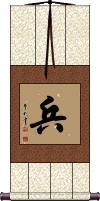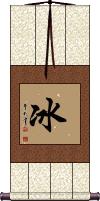The Name Bing in Japanese/Chinese on a Custom-Made Wall Scroll.
Click the "Customize" button next to your name below to start your personalized bing calligraphy artwork...
Bing
Ice / Frost
冰 is the Chinese character used to express “ice” or “frost.”
The main part of the character on the right holds the meaning of “water” and on the left, is a radical (the two dots) that also means water. Together, they create the character that means “ice” (solid water).
This is similar to the character for frost in Japanese. However, Japanese drop the radical from the left side.
Soldiers
兵 can be used to express soldiers, troops, a force, an army, weapons, arms, military, warfare, tactics, strategy, or warlike.
The final meaning depends on context. It's also part of the Chinese title for the Terracotta soldiers. In fact, this character is usually used in compound words (words of more than one character). Sometimes this single character is the title used for the pawns in a chess game (in a related issue, this is also a nickname for soldiers with the rank of Private).
This in-stock artwork might be what you are looking for, and ships right away...
The following table may be helpful for those studying Chinese or Japanese...
| Title | Characters | Romaji (Romanized Japanese) | Various forms of Romanized Chinese | |
| Bing | 兵 | bīng / bing1 / bing | ping | |
| Ice Frost | 冰 | bīng / bing1 / bing | ping | |
| Soldiers | 兵 | hei | bīng / bing1 / bing | ping |






